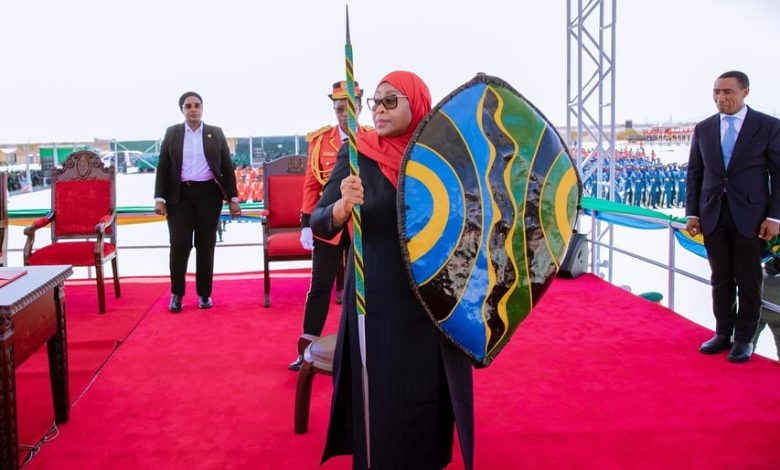Samia’s inauguration and Tanzania’s doctrine of calm

DAR ES SALAAM: UNDER the fierce Dodoma sun on November 3, 2025, President Samia Suluhu Hassan took the oath of office for her second term within the quiet discipline of the army barracks.
The setting was deliberate intimate, secure and strategic.
To critics, it suggested distance; to those who understood its meaning, it represented precision a leader reclaiming calm, authority and truth after Tanzania had faced an invisible assault on its confidence, economy and cohesion.
The nation she addressed was not collapsing but destabilised by perception. Inflation stood at 3.4 per cent, the shilling was steady at around 2,450/- to the dollar and foreign reserves covered more than five months of imports.
Yet in the days before her inauguration, Tanzania faced a wave of digital misinformation anonymous posters, manipulated videos and false alerts predicting unrest.
The result was panic buying, hoarding, and temporary price spikes. It was not real inflation; it was synthetic an engineered psychological and economic disturbance driven by fear.
Another narrative quickly followed: the absence of numerous world leaders. Critics framed this as diplomatic isolation. Yet the reality was logistical.
The inauguration took place within seventytwo hours of electoral confirmation a window too narrow for full international attendance. Security and protocol arrangements for visiting heads of state typically require a week’s notice.
In a climate unsettled by misinformation and logistical disruption, Tanzania’s decision to move fast prioritised stability over spectacle. Even so, key allies were present.
Leaders and representatives from neighbouring countries, along with highlevel envoys from across East and Southern Africa, attended the ceremony.
Delegations from Uganda and Kenya joined others representing the African Union (AU), Southern African Development Community (SADC) and East African Community (EAC). Ambassadors from China, the United States, the European Union and the United Nations filled the diplomatic gallery.
Their presence, modest in number but meaningful in weight, affirmed Tanzania’s continuity and calm proof that legitimacy today is built on trust, not theatrics.
Each delegation reflected shared experience nations that had themselves endured economic stress or misinformation and emerged through reform.
Their attendance symbolised solidarity rather than mere ceremony. Critics who measure diplomatic recognition by crowd size overlook how modern diplomacy functions.
In today’s interconnected world, legitimacy is not defined by who flies in, but by who engages through dialogue, cooperation and continuity.
Within hours of the ceremony, the AU, EAC, SADC, EU, China, the United States and the United Nations all issued statements congratulating President Samia and reaffirming partnerships with Tanzania.
In an era where diplomacy is digital and security is hybrid, recognition is measured by consistency, not optics.
What Tanzania encountered in 2025 was not unique. Around the world, nations have faced attempts to distort perception through digital manipulation.
Kenya’s 2022 and Nigeria’s 2023 elections were affected by deepfake campaigns; France’s 2017 election, the UK’s Brexit vote and the US’s 2016 and 2020 elections all revealed foreign interference.
ALSO READ: Why President Samia’s completion of SGR train is pivot to our national destiny
Across Asia and South America, similar tactics sought to undermine trust in democratic processes.
The pattern is clear: accelerated technology has turned disinformation into an instrument of influence. For years, Tanzania was partially shielded from this trend due to limited internet penetration.
But by 2025, with social media woven into daily life across Dar es Salaam, Arusha, Mwanza, Mbeya, and Dodoma, the nation had joined the global information battlefield where perception can be hacked faster than truth can recover.
In this environment, leadership is not only administrative or economic; it is psychological. Governing in the digital age means managing national emotion and collective focus as carefully as fiscal or foreign policy. President Samia’s poise reflected that evolution.
Her calm was not merely temperament; it was strategy the stabilisation of national sentiment through composure. Her navy-blue coat symbolised steadiness; her red scarf, courage; the gold emblem, duty.
A simple black watch marked endurance, while her understated jewellery and plain shoes grounded the image in humility.
Every element conveyed discipline and continuity a leader returning the nation to normalcy through restraint, not spectacle.
When she addressed the nation, her words followed a deliberate rhythm: “Let us choose humility over pride, patience over grievance, compassion over anger, and unity over division.” Each contrast carried a policy message disguised as moral reflection a subtle recalibration of national mood after weeks of tension.
Her acknowledgment of regional leaders reinforced the idea that Tanzania’s peace is regional peace that the stability of Dar es Salaam, Nairobi, Kampala and Maputo are intertwined.
The ceremony, modest but firm, repositioned Tanzania as a quiet anchor in a volatile region and reaffirmed East Africa’s strength in coordination rather than confrontation. Later in her address, President Samia quoted the late Benjamin Mkapa: “We received compliments with humility but rejected instructions on what to do as a country.”
The line bridged generations of Tanzanian leadership. Mkapa resisted economic dependence; Samia resists narrative dependence. Both defended sovereignty one from external control, the other from digital manipulation.
In a world where governance and defence increasingly overlap, Tanzania’s swift, secure inauguration was not merely a constitutional event but a strategic assertion: that in the information age, composure is deterrence.
The attendance of regional leaders, ambassadors, and dignitaries demonstrated that recognition remains intact.
The absence of mass crowds was intentional a reflection of prudence in an unpredictable digital climate. Tanzania chose clarity over crowds, precision over performance.
Under the relentless Dodoma sun, President Samia Suluhu Hassan did not seek validation; she defined it. In an era where perception is power, her inauguration became a doctrine in itself: that true strength lies not in noise, but in control.
Through that calm control, Tanzania found its balance once again. Long live Tanzania, long live Africa.





